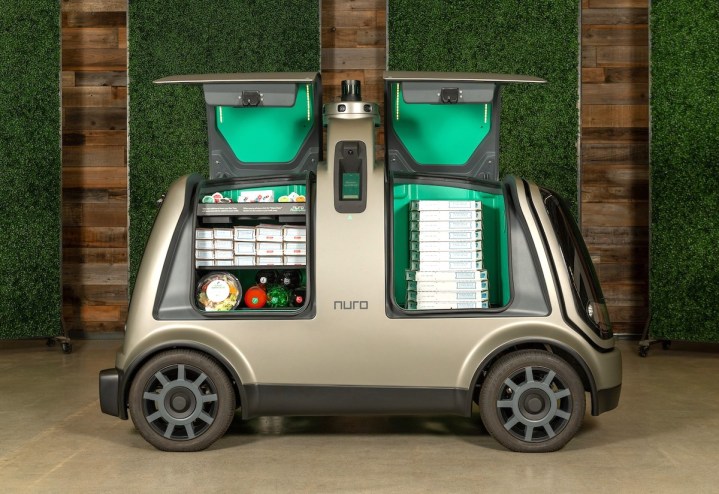
Global pizza purveyor Domino’s is planning to use self-driving pods to deliver its cheesy meals to hungry customers.
The food company is partnering with California-based tech startup Nuro for a trial service in Houston, Texas later this year.
Nuro has been gaining attention since its creation in 2016 by Dave Ferguson and Jiajun Zhu, both former members of Google’s autonomous-car team, now called Waymo. Earlier this year, the startup received funding of almost $1 billion from Japanese telecommunications giant SoftBank. The interest has a lot to do with the design of its nifty-looking autonomous delivery pod. The driverless vehicle, a newer version of which will be used by Domino’s, is already being tested in a trial service in Scottsdale, Arizona, delivering Kroger groceries to customers’ homes.
Domino’s customers keen to have a driverless pod roll up outside their door can opt in to the special delivery service when they place their pizza order online. The pod’s progress can be tracked in the Domino’s app, which will also provide a unique PIN code to unlock a compartment in the pod so customers can take their pizza.
Domino’s has already partnered with Ford for trial pizza delivery services in Ann Arbor, Michigan and Miami, Florida, with the car giant using Ford Fusion Hybrid vehicles modified by driverless tech company Argo, which the automaker acquired in 2017.
Nuro’s pod is markedly different from Ford’s self-driving vehicle as it has been custom built and has no space for a human safety driver. Instead, for the trial period at least, a Nuro engineer will follow the pod in another vehicle traveling close behind.
“We are always looking for new ways to innovate and evolve the delivery experience for our customers,” Kevin Vasconi, Domino’s executive vice president and chief information officer, said in a release. “Nuro’s vehicles are specially designed to optimize the food delivery experience … The opportunity to bring our customers the choice of an unmanned delivery experience, and our operators an additional delivery solution during a busy store rush, is an important part of our autonomous vehicle testing.”
Commenting on the partnership, Cosimo Leipold, Nuro’s head of partner relations, said: “We see incredible opportunity in offering Nuro’s world-class autonomous technology to Domino’s customers, accelerating our shared mission to transform local commerce.”
But it’s not yet clear what people really think of meal-delivering autonomous vehicles, though the trials will of course encourage customer feedback. After all, with this type of service, the customer has to leave their home and head to the roadside to collect the pizza from the vehicle instead of receiving it from the delivery person at the front door. Also, the Nuro has a top speed of just 25 mph, suggesting that a human delivery driver would be able to reach the delivery address more quickly. As the technology develops, however, driverless vehicles are expected to increase their top speed.
Meal delivery using drones seems like a far quicker — not to mention cooler — way to receive your dinner, but such a system still faces a slew of regulatory hurdles.


